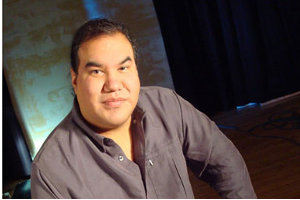Films each representing a different genus.
So, one of the projections, Smoke Signals (Smoke Signals),
is a family
comedy that speaks of disagreement between parents and children. "This is a film that managed to exhibit in several U.S. theaters.
He has reached the large audience because it deals with issues that
affect everyone, regardless of culture or country, "Eyre guaranteed.
This is the objective pursued in his first visit to the country. Filmmaker seeks to reach a new audience for it to watch movies that through the regular channels, could not. The tapes are projected at 16.00 at the Cinémathèque (c. Oscar Soria), until Friday. The cycle begins with the film A Thousand Roads.
He also wants to share experiences with Bolivian filmmakers and their works. Although Eyre will leave the country this week, the cycle will continue. The films will be screened at Potosi, Tarabuco Yotala, Oruro and Uncía.
Not all his films are so friendly to the taste of most of the audience.
Skins, which will be presented on Friday, is a film that combines drama
of a family affected by alcoholism in a police thriller, parallel,
explores the spirituality of First Nations.
"The same people who went to see Smoke signals Skins did not go because
they do not like to see the darker parts of the story," he said.
In that sense, Eyre felt that the mystification of Native Americans
that is done on the screen, big and small, is the result of selective
blindness.
For the director, American society adopted the structure of tragic
mythology of Greece and Rome, which defeated enemies take almost divine
qualities as the great warrior or spiritual being.
"It is somewhat paradoxical. We beat them, but in fiction we are invincible. Not real, but we appreciate because we ideally represents. But we want change so that people see us as mere "he said. That looks after the creation of his characters. For the filmmaker, each of which is three-dimensional, with flaws and virtues.

No comments:
Post a Comment